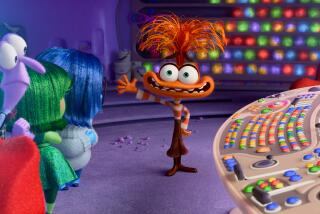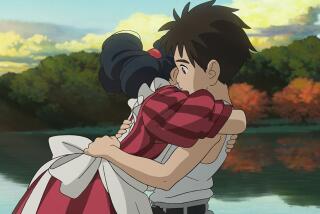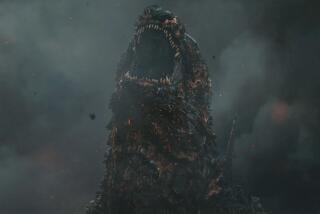Japan Moviegoers Giving âPearl Harborâ a Boost
TOKYO â Twenty-five-year-old office worker Yumiko Fuse had heard about the controversy surrounding the film âPearl Harborâ before she spent $15 for a ticket: How it supposedly bashed Japan, was released at an inopportune time and had been sanitized to appeal to Japanese viewers.
In the end, though, none of that really mattered.
âI loved it,â she said, standing beneath a giant poster promoting the movie in Tokyoâs ritzy Ginza district. âI loved the storyâs simplicity, and the battle scenes were incredible. I especially liked the ending, which made me cry.â
Fuseâs tears are bringing joy and relief to executives at Walt Disney Co. and its Buena Vista International distribution arm. Both companies are counting on Japan--the top foreign market for Hollywood movies--to help boost ticket sales after a less-than-stellar U.S. opening of the $140-million production.
Itâs still early in the filmâs foreign release, but so far Japan is doing its part to make up the shortfall. By heavily marketing the war movie as a love story, Buena Vista recorded opening box-office results last weekend of $7.1 million. This is the Japanese distributorâs most lucrative premier and the nationâs sixth most successful start for any film.
âWeâre very happy,â said Dick Sano, general manager of Buena Vista. âWe were quite nervous because this movie was so talked about--both good and bad.â
Still, analysts said the real test will come after the opening hoopla dies down and competition heats up.
âBuena Vistaâs strategy worked really well,â said Yasuo Kawabata, managing director of Jiji Film Press, a trade magazine. âThat said, we still have to see how next week goes.â
âPearl Harborâ didnât open as well as Steven Spielbergâs âA.I.,â which topped Japanâs charts two weeks earlier. And it lagged such past blockbusters as âMission Impossible II,â âStar Wars: Episode I The Phantom Menace,â âThe Lost World: Jurassic Parkâ and âIndependence Day.â
Movie to Face Several Strong Competitors
Furthermore, Disney still has a long aisle ahead before it reaches its $80-million, 18-week target for the Japanese market. In addition to âA.I,â which also entered Japan after soft results in the U.S., several other strong rivals are set to open here in coming weeks. These include âPlanet of the Apes,â âJurassic Park III,â Pokemon film âCelebi: A Timeless Encounterâ and a much anticipated Japanese animation film by Hayao Miyazaki called âSpirited Away.â
The many offerings come at a time when Japanese are spending less on movies, said Yoshio Kakeo, director of industry publication Kinema Jumpo.
Japanese viewers see an average of one or two movies a year, compared with five for Americans. Part of this is due to high ticket prices. But Japanese also face more competition for their leisure funds even in remote areas, given the popularity of karaoke, cell phone services, video games, comic books and sports.
âIf Pearl Harbor reaches $35 million, theyâll be doing pretty well,â Kakeo said. âTo get a megahit, theyâll need to attract a lot more high school and college students. Many young people, however, find it painful to sit through a three-hour movie.â
Analysts attribute the strong showing of âPearl Harborâ partly to a $12-million marketing blitz that targeted three distinct groups--young Japanese women interested in the filmâs love story, their boyfriends attracted to the battle scenes and senior citizens who lived through the war years and wanted to revisit some of the memories.
Though hefty, the promotion budget is in line with other American openings in Japan. The budget was $14.4 million for âA.I.â and $10 million for âArmageddon.â
The distributor also managed to navigate through some badly timed news events. Just as the publicity machine for the Japanese launch was revving up, a U.S. nuclear submarine surfaced under a Japanese fishing vessel off Pearl Harbor, Hawaii, killing nine Japanese from a small town in western Japan. Two weeks ago, Japanese anger boiled over again when a U.S. Air Force sergeant was accused of raping a Japanese woman in Okinawa.
Disney quickly tried to distance itself from the controversies. Ultimately, however, the news events helped publicize the film, landing it prominently on the news pages rather than in the entertainment sections.
Japanese critics also were kinder to the film than their U.S. counterparts. Part of this is cultural. Critics here are far less biting in general because of a cultural preference for avoiding confrontation. Beyond that, analysts said, U.S. and Japanese columnists often focused on different criteria.
While many U.S. critics slammed âPearl Harbor,â calling its story line simple, the acting weak and its premise unconvincing, Japanese critics generally paid more attention to historical details or to how the Japanese were portrayed. When they did focus on the story, a far larger percentage were wowed by the scope, special effects and attention paid to the common soldier.
âJapanese generally love American blockbusters,â said Nahoko Kimura, an independent film critic. âI loved it. It was great entertainment.â
Viewer surveys, meanwhile, show that for many Japanese, the term âPearl Harborâ evoked images of weddings, vacations, celebrities, even shopping, given Hawaiiâs popularity as a tourist destination, rather than negative war connotations.
âOur generation is not so sensitive about World War II history,â said Shinichi Nagashima, a 40-year-old high-tech worker who recently vacationed in Hawaii.
Through it all, the Japanese distributor continued to hammer away at the message that the movie was apolitical, nondiscriminatory and appealed to a range of audiences.
Changes to Script Curbed Controversy
The fact that the movie didnât create more domestic controversy was no accident. Japanese executives read the script early and made suggestions aimed at removing any stereotypical depictions of Japan. They also shot their own trailer to play up the romance theme and changed several lines to avoid offending Japanese viewers.
In the closing voice-over, star Kate Beckinsale, referring to Jimmy Doolittleâs surprise raid on Tokyo that galvanized Americans, declares âBefore Doolittleâs raid, Americans knew nothing but defeat; after it, nothing but victory.â In the Japanese version, this became âafter it, there was hope of victory.â
In the end, the signs looked good enough for Disney to dispense with the usual sneak previews and instead stage a massive pre-opening extravaganza at the Tokyo Dome stadium for 30,000 people. The appearance of heartthrob star Ben Affleck was met by the screams of hundreds of young women.
Despite the stiff competition ahead, Sano of Buena Vista is optimistic that box-office receipts and viewer buzz for âPearl Harborâ will remain strong. His barometer? Various conventional and unconventional tools of the marketing trade, including what he said is generally positive chatter coming from bathrooms after the show.
âNo one lies in the toilet,â he said.
*
Rie Sasaki of The Timesâ Tokyo Bureau contributed to this report.
More to Read
The biggest entertainment stories
Get our big stories about Hollywood, film, television, music, arts, culture and more right in your inbox as soon as they publish.
You may occasionally receive promotional content from the Los Angeles Times.










